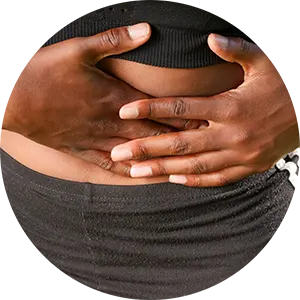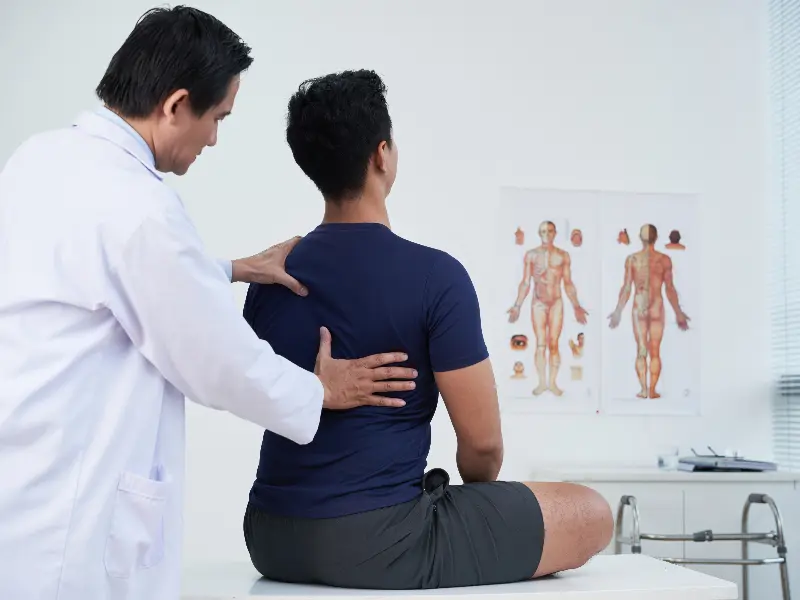
Digestive Disorders
Chiropractor For Digestive Disorders in Little Falls, NJ
Food is our fuel. It gets broken down during the digestive process and converted to nutrients that we absorb to power our entire body. Digestion problems are relatively common and typically involve the stomach, small intestine, and colon. These problems may be congenital or the result of a disease or nervous system dysfunction. Complications from digestion problems can include malnutrition, weight loss, constipation, and diarrhea. The main causes of digestion problems include physical disorders, psychological disorders, and certain drugs or foods.
The nervous system controls the digestive system. Chiropractic care optimizes nervous system function, ensuring the entire body functions at its best. There are plenty of medications out there to help relieve digestive issues, but long-term exposure to antibiotics and medication can damage gut health, which has adverse effects on immunity and cardiac health. The chiropractic approach to treating digestion problems looks to correct the underlying cause of the problem. This non-invasive, natural strategy alleviates the symptoms and helps prevent recurring problems.
Process
How Our Digestion Improvement Plan Works
Schedule Your New Patient Exam
Set up a time so you & your doctor can do a thorough history & examination to determine the root cause of your pain.
Get A Customized Plan of Action
Your Doctor will create a custom plan of attack to not only get you out of pain fast but to keep you out of pain long term.
Live A Pain Free Energetic Life
Receive care you need for your problem so you can get back to the time when pain wasn’t dictating what you could do.
How We Treat Digestive Disorders In Little Falls, NJ
The specific treatment techniques we use may vary depending on the individual patient and the nature of their condition. Here are the techniques we use as part of our digestion disorder treatment plan:
Comprehensive Consultation and Exam
Our digestive system is complex, and problems can quickly lead to serious health issues. We will do our best to determine the root cause of your symptoms and how these symptoms may be impacting your everyday life. A comprehensive consultation and exam will allow us to determine what is causing your digestive issues and create a treatment plan to correct the problem and prevent it from returning.

Specific Chiropractic Care in Little Falls, NJ
After a thorough examination, we will determine which specific adjustments are most effective for improving the condition of your digestion. Subluxation - misalignment in the spine - irritates nearby nerves and interferes with communication between the brain and the body, resulting in symptoms like pain and common digestive issues like constipation, IBS, and acid reflux. Even though many people experience symptoms from other systems in the body due to digestive problems, restoring proper function to the digestive system is a crucial step in restoring health and well-being. We will do everything possible to help you improve your digestive system's operation, maximize its healing potential, and achieve long-term results. It is important to note that our patients with digestive problems often report positive effects on other body systems immediately following their treatment.
Nutritional Guidance
We will discuss the most suitable foods for your digestive needs. We will review various dietary restrictions and discuss the best way to continue eating healthy while eliminating foods that may contribute to poor digestion. The digestive tract absorbs the nutrients you eat, so paying attention to everything that goes into your diet to maximize its healing potential is imperative. The Standard American Diet is very unhealthy, lacking nutrition and often leading to various digestive issues. In some cases, supplementation can be extremely beneficial to compensate for nutrient deficiencies due to your diet.
Reviews
Hear From Patients Just Like You
Common Digestive Disorders in Little Falls, NJ
GERD
GERD is a common problem that impacts around 20% of the population. Gastroesophageal Reflux Disease, often referred to as acid reflux, occurs when excess acid travels back up from the stomach into the esophagus and causes irritation and inflammation of the lining of this passageway between the stomach and throat. It's most common in people who have a weak lower esophageal sphincter. This sphincter, situated just above the abdomen, is the valve that keeps stomach acid from flowing back into the esophagus. When this valve is weak, the acid can flow into one's esophagus at any time and cause heartburn or severe stomach pain. It may also result in the corrosion of one's esophagus and a condition known as Barrett's Esophagus.
IBS
Irritable Bowel Syndrome is one of the most common gastrointestinal problems. IBS tends to affect people without any accompanying diseases or disorders. It's usually a precursor to more severe problems like diverticulitis and colon cancer. IBS can be hard to diagnose since symptoms frequently mimic other conditions, and many people don't know they have it until they go to the doctor and are told there is something wrong with them. Symptoms of IBS include abdominal pain, diarrhea, constipation, bloating, urgency in passing urine or stool, nausea, and vomiting. Those with IBS may experience symptoms in some or all of these categories, but only rarely will they have more than one symptom at a time.
Crohn’s Disease
Crohn's disease is a form of inflammatory bowel disease (IBD) that occurs when the immune system attacks and damages the walls of your digestive tract. The main areas of the digestive tract that can be affected are the small and large intestines. People with Crohn's disease may experience abdominal pain, diarrhea, weight loss, bleeding, severe cramping, inflammation, and abscesses in their small intestines. It can also cause complications with their bowels or bladder.
Constipation & Diarrhea
Constipation and diarrhea are quite common but also dangerous to one's health. These two symptoms are often related to one's diet, lack of exercise, and dehydration. They may also indicate something more severe, like digestive tract problems. It's essential to seek help when this happens. Prolonged constipation or diarrhea can result in dehydration, rashes, flushing, and severe skin conditions such as eczema, psoriasis, and dermatitis. It can also cause severe cramping and dehydration and may even be fatal. In children, prolonged constipation or diarrhea can cause severe dehydration and malnutrition, leading to brain damage and even death.
Bloating & Gas
Both gas and bloating can be frustrating problems to deal with and can be symptoms of severe digestive tract problems such as gastroesophageal reflux disease (GERD), constipation, irritable bowel syndrome (IBS), ulcers, or tumors in the digestive tract. These conditions can lead to pain and cramping in the stomach and back, nausea, and vomiting. In severe cases, the gas buildup can cause one to pass more than just gas; it can also lead to intense abdominal pain due to pressure on internal organs.
Dyspepsia
Dyspepsia is a widespread digestive problem. It occurs when the stomach has difficulty digesting food properly, causing upper abdominal pain, nausea, and vomiting. It may also result in a burning sensation within the abdomen that worsens whenever ingesting food. The pain is typically temporary and won't cause any long-term damage to your organs. However, if you notice that you have been suffering from frequent or severe bouts of dyspepsia, you should get examined by a physician for further testing and diagnosis.
Other symptoms may include:
- Weight loss or weight gain
- Constipation or diarrhea
- Bloating and swelling in the abdomen or chest area after eating
Ulcerative Colitis
Ulcerative colitis is an inflammatory bowel disease (IBD) affecting the large intestine and rectum. There are different types of IBD, but ulcerative colitis causes the most damage to the lining of your digestive tract. It occurs when white blood cells attack the cells that line your colon and rectum, causing them to produce more mucus. As a result, ulcers form on your colon walls, leading to chronic inflammation and pain. Ulcerative colitis can also cause fatigue, weight loss, cramps or diarrhea, and bleeding from the rectum or vagina (although this is less common). You should consult with a physician if you have any symptoms of this condition.
Lactose Intolerance
Some people cannot digest lactose, the primary sugar in milk. Lactose intolerance is not a disease but can cause mild to severe symptoms like bloating and gas, diarrhea, and stomach cramps after eating or drinking lactose foods. If you notice that you're experiencing these symptoms more often than not, it may be because your body cannot properly digest lactose. If you don't want to give up dairy products altogether, consider trying supplemental products that contain lactase, an enzyme that breaks down lactose so it can easily be digested.
Check Out Our Location Near You
27 E Main St, Little Falls, NJ 07424
Frequently Asked Questions
Can chiropractors help digestion?
Yes! Chiropractic care can help individuals suffering from digestive disorders. Chiropractors are trained and experienced in the proper techniques to help with spinal injuries and abnormal spinal alignment. Spinal adjustments treat digestive disorders by removing pressure from the spine and allowing better performance of the nerves that travel through it, either directly or indirectly. Chiropractic adjustments also improve circulation, which is crucial for proper digestion. Some people also report a reduction in bloating, gas, heartburn, and other symptoms of digestive problems.
Can a misaligned spine cause digestive problems?
Yes, a misaligned spine can irritate nerves and disrupt nerve flow to the digestive tract. This affects the function of the vital digestive organs and processes, resulting in issues like diarrhea, constipation, acid reflux, bloating, and IBS. If you suffer from any of these digestive problems, chiropractic care can help you by relieving pressure on the nerves to improve function.
How does chiropractic release toxins?
The nervous system controls everything in your body, including the digestive process. Nerves branch off of your spine and travel to all vital organs of your body. Spinal misalignments can lead to a disruption in bodily function and one of the first effects is often a disruption in digestion. Chiropractic adjustments realign the spine to remove pressure on the nerves that may be causing digestive issues while also increasing the overall circulation of blood to the vital organs that make up your gastrointestinal tract. Increased circulation helps remove toxins or waste material that may be building up so they do not accumulate over time.
What part of the spine controls digestion?
Nerves traveling through the thoracic spine (mid back) control the esophagus, stomach, and small intestine, while nerves in the lumbar spine (lower back) control the large intestine and colon.
Can a chiropractor help a bloated stomach?
Yes! Chiropractic care can help reduce stomach bloat. A chiropractor can work on the nervous system through chiropractic adjustments to help relieve tension that may be causing food to move slower through your digestive system. Since your digestive tract works on a 24-hour schedule, any disruption in digestion can affect your gut's ability to process food appropriately, and it could lead to a feeling of bloating. In addition, since digestion is directly connected to the nervous system, any misalignment in the spine can also disrupt proper digestion and increase stomach bloating.
How do I get fast relief for IBS?
Chiropractic care can help reduce IBS-related bouts of painful diarrhea and constipation. The nervous system controls the digestive system, so proper nervous system function plays a role in relieving IBS symptoms. Chiropractors can adjust your spine's alignment to alleviate nerve irritation, which will relieve tension in your digestive system and reduce any intestinal pain caused by this condition.

